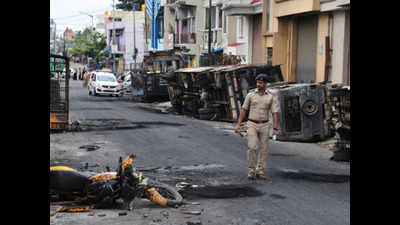- News
- City News
- bengaluru News
- Karnataka: Online abuse campaigns go unchecked
Trending
This story is from August 14, 2020
Karnataka: Online abuse campaigns go unchecked
Tuesday night’s violence in Bengaluru is another grim reminder of how social media has become a platform to foment social discord. There have been at least 23 communal flare-ups over the past three years in the state, all triggered by social media posts.

A policeman on Thursday checks out wreckage, following the violence in Bengaluru
BENGALURU: Tuesday night’s violence in Bengaluru is another grim reminder of how social media has become a platform to foment social discord. There have been at least 23 communal flare-ups over the past three years in the state, all triggered by social media posts.
On August 9, a post on Facebook by Naveen, nephew of Congress MLA Akhanda Sreenivasa Murthy, triggered a riot leading to the death of three people.A few days previously, a post with morphed pictures of Prime Minister Narendra Modi and Union home minister Amit Shah by a teenager kept the Davanagere administration scrambling to douse the fury.

On February 16, Amulya Leona, who was arrested for raising offensive slogans, wrote a Facebook post in Kannada which caused tension in different parts of the state. In coastal districts of Dakshina Kannada, Udupi, Uttara Kannada and Malnad districts of Kodagu, Chikkamagaluru and Shivamogga, hate messages are disturbingly common.
However, the state government has no effective mechanism to check this menace. The major reason for violence in Bengaluru, which police officials admit, is the inordinate delay in acting against hate messages.
“If the police had an effective system, this could have been possibly prevented. It’s a systemic failure of the intelligence gathering team as they didn’t get to know the anger brewing among people in DJ Halli and KG Halli,’’ another officer pointed out.
The government has set up a cyber surveillance team to keep a check on such activities but it’s proving a daunting task to keep an eye on WhatsApp groups, Twitter handles and Facebook accounts.
“Every month, we receive at least 300 complaints of people uploading sensitive content. We track users and try to find the origin, and there’s a dedicated team that delete such posts. There are many WhatsApp groups in which videos, audios and images of rioting are circulated. Sadly, we haven’t been to crack down on all of them,” said an officer in the cyber crime unit.
On August 9, a post on Facebook by Naveen, nephew of Congress MLA Akhanda Sreenivasa Murthy, triggered a riot leading to the death of three people.A few days previously, a post with morphed pictures of Prime Minister Narendra Modi and Union home minister Amit Shah by a teenager kept the Davanagere administration scrambling to douse the fury.

On February 16, Amulya Leona, who was arrested for raising offensive slogans, wrote a Facebook post in Kannada which caused tension in different parts of the state. In coastal districts of Dakshina Kannada, Udupi, Uttara Kannada and Malnad districts of Kodagu, Chikkamagaluru and Shivamogga, hate messages are disturbingly common.
“Social media platforms are being used to create instability in the state. The IT wings of major political parties are using digital platforms to spread hatred,” said a senior police officer.
However, the state government has no effective mechanism to check this menace. The major reason for violence in Bengaluru, which police officials admit, is the inordinate delay in acting against hate messages.
“If the police had an effective system, this could have been possibly prevented. It’s a systemic failure of the intelligence gathering team as they didn’t get to know the anger brewing among people in DJ Halli and KG Halli,’’ another officer pointed out.
The government has set up a cyber surveillance team to keep a check on such activities but it’s proving a daunting task to keep an eye on WhatsApp groups, Twitter handles and Facebook accounts.
“Every month, we receive at least 300 complaints of people uploading sensitive content. We track users and try to find the origin, and there’s a dedicated team that delete such posts. There are many WhatsApp groups in which videos, audios and images of rioting are circulated. Sadly, we haven’t been to crack down on all of them,” said an officer in the cyber crime unit.
End of Article
FOLLOW US ON SOCIAL MEDIA










